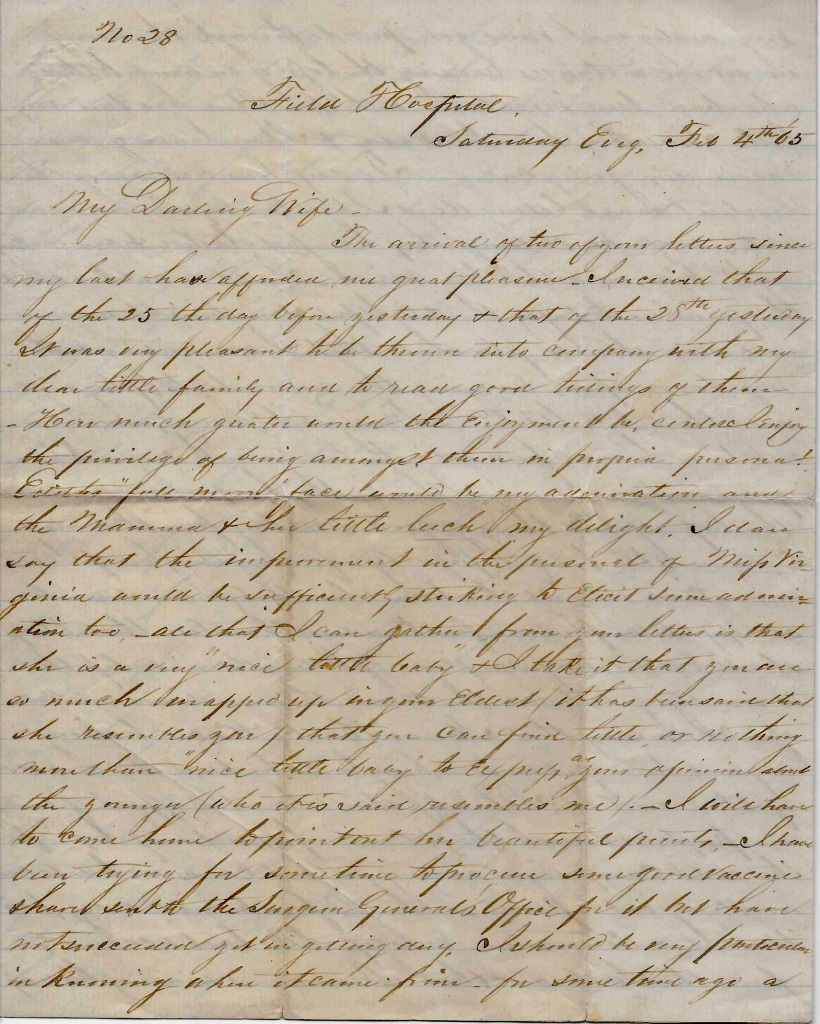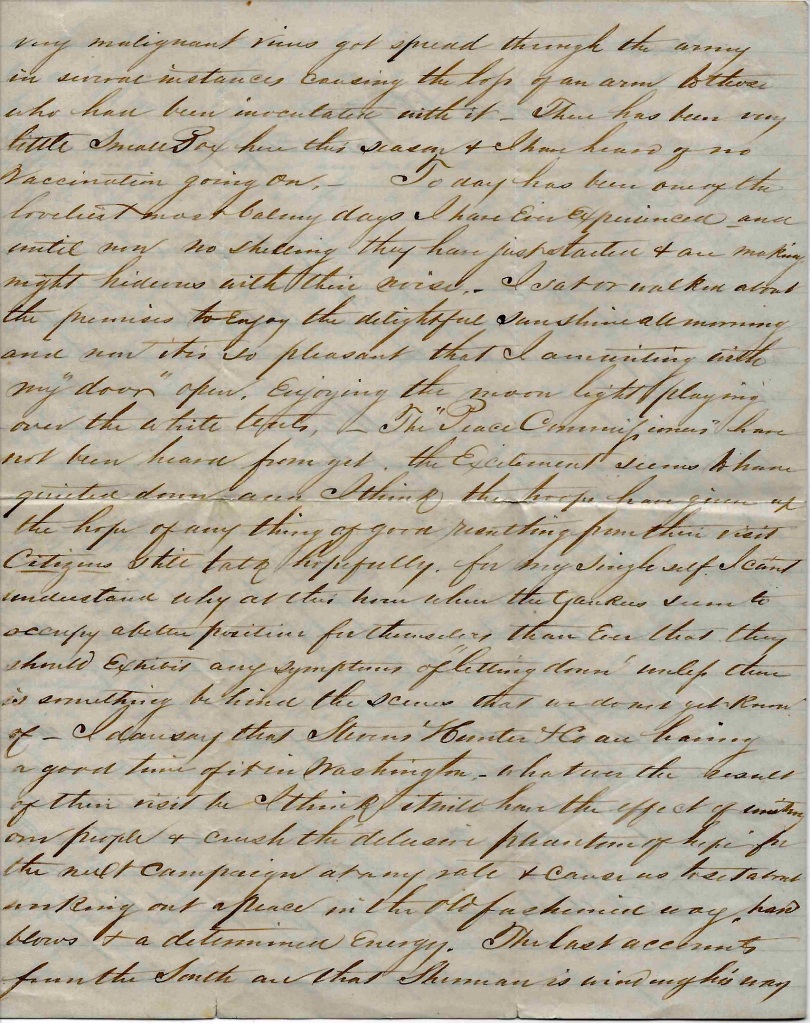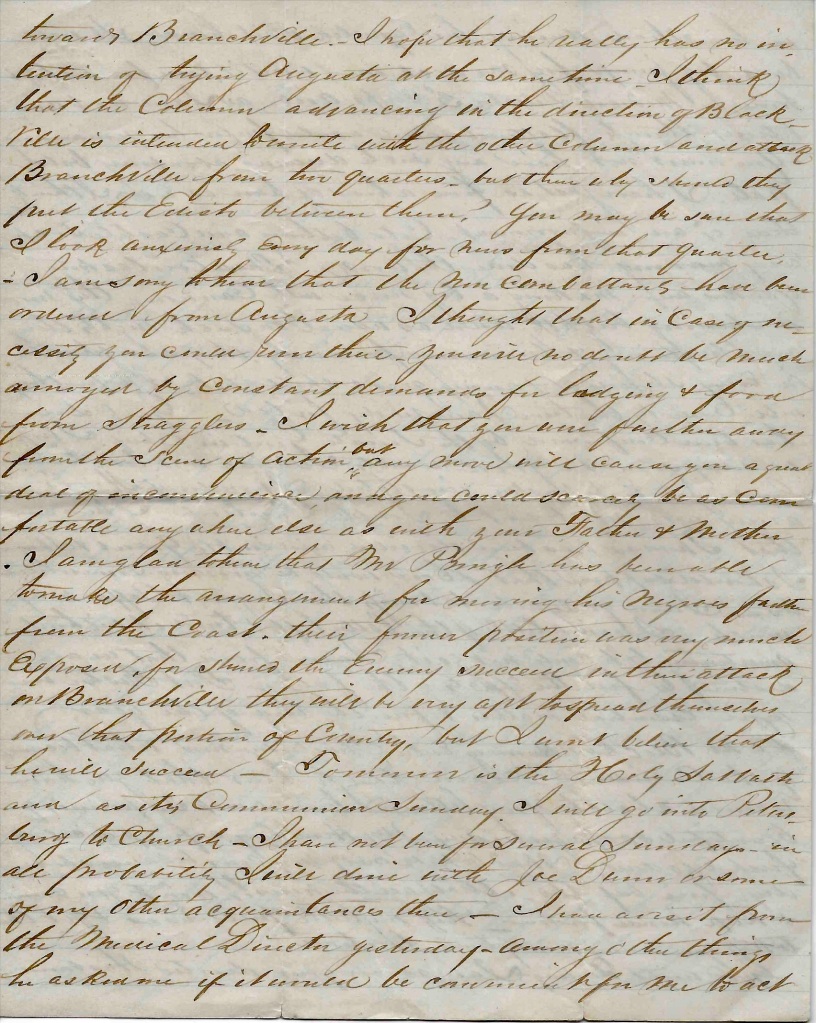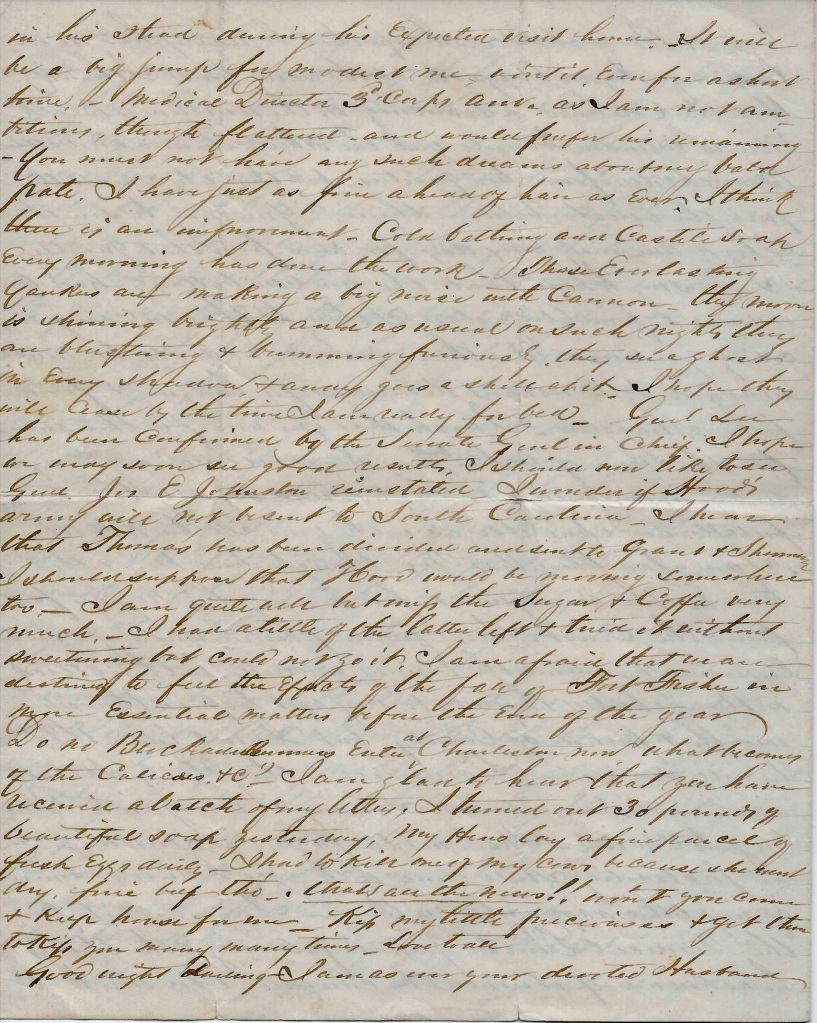This unsigned 1865 letter is believed to have been written by Francis LeJau Frost (1837-1912), a Confederate surgeon in A. P. Hill’s Third Corps, Army of Northern Virginia. Francis was the son of Judge Edward Frost and Harriet Vanderhorst Horry. Following the war he took up planting, and was one of the organizers of the fertilizer business in South Carolina, and for eighteen years was head of a large industry of that kind in Charleston.
Everything within the letter seems to corroborate his identity, but there are discrepancies regarding his marriage date. According to genealogical and newspaper records, he didn’t marry until 11 December 1866. The bride was Rebecca Brewton Pringle (1839-1905), the daughter of William Bull Pringle (1800-1881), who is identified as “Mr. Pringle” in the letter. William Pringle was a substantial landowner, with four rice plantations and over 300 slaves. However, the records do not mention Frost’s daughters, Editha and Virginia, either, leading to further doubt.
Despite the absence of confirmation regarding the author’s identity, the decision was made to publish the content due to its high quality, with the hope that someone may step forward with a positive identification. This letter originates from Greg Herr’s personal collection and was transcribed and published on Spared & Shared with his explicit consent.
Transcription
Field Hospital [near Petersburg, Virginia]
Saturday Evening, February 4th 1865
My darling wife,
The arrival of two of your letters since my last have afforded me great pleasure. I received that of the 25th the day before yesterday & that of the 28th yesterday. It was very pleasant to be thrown into company with my dear little family and to read good tidings of them. How much greater would the enjoyment be could I enjoy the privilege of being amongst them in proper persona! Editha “full moon” face would be my admiration and the Mamma & her little leech my delight. I dare say that the improvement in the perusal of Miss Virginia would be sufficiently striking to elicit some admiration too—all that I can gather from your letters is that she is a very “nice little baby” & I take it that you are as much wrapped up in your eldest. It has been said that she resembles you—that you can find little or nothing more than “nice little baby” to express “your opinion about the youngest (who it is said resembles me). I will have to come home to point out her beautiful points.
I have been trying for some time to procure some good vaccine share sent to the Surgeon General’s Office for it but have not succeeded yet in getting any. I should be very particular in knowing when it came here for some time ago a very malignant virus got spread through the army in several instances causing the loss of an arm to those who had been inoculated with it. There has been very little small pox here this season & I have heard of no vaccination going on.
Today has been one of the loveliest, most balmy days I have ever experienced and until now, no shelling. They have just started & are making night hideous with their noise. I sat or walked about the premises to enjoy the delightful sunshine all morning and now it is so pleasant that I am writing with my “door” open, enjoying the moonlight playing over the white tents.
The “Peace Commission” have not been heard from yet. The excitement seems to have quieted down and I think the troops have given up the hope of anything of good resulting from their visit. Citizens still talk hopefully. For my single self, I can’t understand why at this hour, when the Yankees seem to occupy a better position for themselves than ever, that they should exhibit any symptoms of “letting down” unless there is something behind the scenes that we do not yet know of. I dare say that Stevens, Hunter & Co. are having a good time of it in Washington, whatever the result of their visit be. I think it will have the effect of uniting our people and crush the delusive phantom of hope for the next campaign at any rate, and cause us to set about working out a peace in the old fashioned way—hard blows & a determined energy.
The last accounts from the South are that Sherman is winding his way towards Branchville. I hope that he really has no intention of trying Augusta at the same time. I think that the column advancing in the direction of Blackville is intended to unite with the other column and attack Branchville from two quarters. But then why should they put the Edisto [river] between them? You may be sure that I look anxiously every day for news from that quarter.
I am sorry to hear that the non-combatants have been ordered from Augusta. I thought that in case of necessity you could run there. You will no doubt be much annoyed by constant demands for lodging & food from stragglers. I wish that you wre further away from the scene of action but any move will cause you a great deal of inconvenience and you could scarcely be as comfortable anywhere else as with your Father and Mother. I am glad that Mr. Pringle has been able to make the arrangement for moving his negroes further from the coast. Their former position was very much exposed, for should the enemy succeed in their attack on Branchville, they will be very apt to spread themselves over that portion of country, but I can’t believe that he will succeed.
Tomorrow is the Holy Sabbath and as it is Communion Sunday, I will go into Petersburg to church. I have not been for several Sundays. In all probability I will dine with Joe Dunn 1 or some of my other acquaintances there. I had a visit from [Dr. John Walker Powell,] the Medical Director yesterday. Among other things, he asked me if it would be convenient for me to act in his stead during his expected visit home. It will be a big jump for modest me, won’t it? Even for a short time. Medical Director, 3rd Corps, Army of Northern Virginia. As I am not ambitious, though flattered, and would prefer his remaining.
You must not have any such dreams about my bald pate. I have just as fine a head of hair as ever. I think there is an improvement. Cold bathing and Castile soap every morning has done the work.
Those everlasting Yankees are making a big noise with cannon. The moon is shining brightly and as usual on such nights they are blustering & bombing furiously. They see a ghost in every shadow and away goes a shell at it. I hope they will cease by the time I am ready for bed.
General Lee has been confirmed by the Senate General in Chief. I hope we may soon see good results. I should now like to see Gen. Jos. E. Johnston reinstated. I wonder if Hood’s army will not be sent to South Carolina. I hear that Thomas has been divided and sent to Grant & Sherman. I should suppose that Hood would be moving somewhere too.
I am quite well but miss the sugar & coffee very much. I have a little of the latter left & tried it without sweetening but could not go it. I am afraid that we are destined to feel the effects of the fall of Fort Fisher in more essential matters before the end of the year. Do no blockade runners enter at Charleston now? What becomes of the calicoes, &c. I am glad to hear that you have received a batch of my letters. I turned out 30 pounds of beautiful soap yesterday. My hens lay a fine parcel of fresh eggs daily. I had to kill one of my cows because she went dry. Fine beef though. That’s all the news!! Won’t you come and keep house for us? Kiss my little precious’s and get them to kiss you many, many times. Love to all.
Good night darling. I am as ever your devoted husband.
1 Joseph Bragg Dunn was born in Petersburg in February 1829 and was educated at the Petersburg Classical & Mathematical Institute and Amelia Academy. In 1861 he was president of the Mechanics’ Cotton Factory at Swift Creek, Chesterfield county. After the war he was superintendent of the Petersburg Iron Works. He died in 1891 and was buried in Blandford Cemetery in Petersburg.








